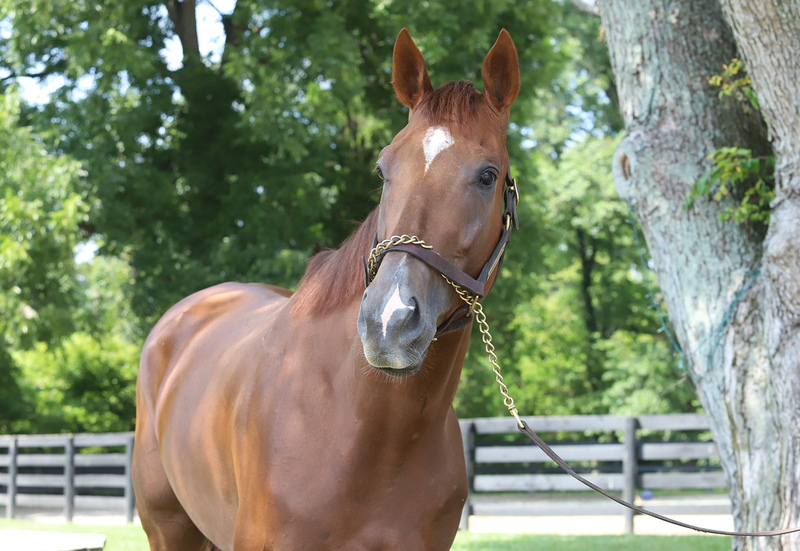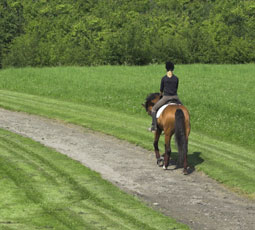Horses are rescued for many reasons, including neglect, abuse and lack of handling. Each horse will react to life changes in his own way, yet there are basic steps rescuers take to bond with these special equines.
The following was adapted from British horseman, Henry Blake’s excellent book, Talking With Horses: A Study of Communication Between Man and Horse (Trafalgar Square; Reprint edition, January 1992).
To begin, the new rescues are isolated for both quarantine and training purposes. A safe, roomy box stall or substantially fenced small pen with indoor/outdoor elements is ideal.
For 30 days one person provides the horse’s every need. He’s given free access to grass hay and water and fed appropriate amounts of grain or treats from a pan, hand-held as soon as he’ll allow it, at least twice a day.
The caretaker (and no one else) spends at least 30 minutes each day quietly speaking or crooning to the newcomer while scratching or running hands over his body. If a day is missed, the 30-day bonding period begins anew.
Slow and easy movements are the rule. The horse’s caretaker approaches his shoulder—not his head—gazing at the ground, speaking or singing, hands at sides, until he accepts the person. First touch is a gentle withers, shoulder or chest scratching. As he allows it, his caretaker strokes the hands across his body until a bond is established and he fully relaxes.
But remember:
- Abused or frightened horses sometimes react tooth and heel. Plot an escape route and don’t let the horse cut you off. Stay alert! It takes just seconds for a terrified horse to run you over or an angry one to attack.
- Halter aggressive horses. If attacked, that halter will afford you control and protection. Use a breakaway halter, always.
- Never move quickly. Don’t rush, and don’t grab. And never raise your voice.
- Don’t expect overnight miracles. Some horses respond in a week, others demand months of patient handling. If you persevere, eventually the horse will bond with you.
Further Reading
Retraining the Rescue Horse
The author keeps a small herd of horses on her Arkansas farm, including several rescues.






Very Interesting article. Thank you for it.
I agree with what the author of this article has to say, as I have rescued several horses and have always approched it in this way. I rescued a mistreated mustang that took me over a year for him to trust me, now he is my best friend that I will keep forever and promised him no one will ever hurt him again, and he knows that, when one of the other 2 geldings he shares his area with bother him and I’m in the pen with them he runs to me and stands behind me. I have 3 other rescued horses I intend to keep that did not take quite as long to bond with as Smokey, then I have rescued 5 others that I nursed back to health both mentally and physically and found good homes for them.
I would add that before too much can be expected of a horse in terms of it’s bonding and socialization with humans, any and all physical issues the horse harbors first need to be identified and addressed. A horse that is in physical pain is not going to necessarily concern himself with relationship building and will certainly not be in a very good mood. Veterinary and farrier assessments are very important to help rule out physical discomfort as a source of behavioral problems. This article was well written but is just the tip of a very big topical iceberg! Volumes could be written on rescues and the rehabilitation process! – Spirit of Hope Farm, Winterport, Maine
Thanks for the great tips!
Good article
I agree with Jen. This article is very well written but only points out one of the many, many points on this topic.
When horses are neglected, abused or mistreated, etc., we have to approach each horse differently. Some times it’s best to look into the horse’s past to find the solution to his problem. For some horses it could be they had a very good home to begin with, but then sold to a home who mistreated and neglected him. And so the horse is prone to react to it badly because he isn’t used to being treated in that manner. For example, a horse who is treated individually by its former owner and loved and has all the attention focused on him could very well react not so well to a new home who would treat him as if he were just any other horse. Therefore forming a problem. If the horse was use to being ‘asked permission’ to do things then he would certainly react badly to having someone focefully putting a saddle and bridle on him or her. So if you’d like to solve a problem like this example, the best idea would be to trace the past owners when everything was fine, identify the problems and when they began to occur and begin to go about your training maybe with Join-Up to let the horse know you trust him, and then move towards getting him to accept the bridle and saddle by ‘asking permission’. Some horses are way too proudly spirited to just let someone forcefully throw a saddle and bridle on and doing tasks that he wasn’t even asked if he’d like to do. But if you were to find the source of the problem, then ask permission, you’d be most likely to see a change within the horse because he would know that the person who is asking permission is someone to respect because he or she understands the horse.
Correction in paragraph: …Join-Up to let the horse know he can trust you.*
good info!
I have 8 rescue horses, and the last part “don’t expect overnight miracles” is so true. One wrong thing happens, and you have to start all over, but it is so rewarding.
I just got in two coming yearlings, and I feel I have made some progress. In ten days, I have gotten halters on both of them, smaller one leads, (a bit) and will give to pressure. Taller one, is just starting to eat grass from my hands, and will follow me for about 10 feet while I am leading him.
It’s a real shame what these poor horses go through. I know when I can afford another horse, it’s coming from a rescue!!
I’ve always wanted to adopt but I feel that I should wait until I’m older and have more experience, since I currently own my first ever horse. It’s a huge responsibility and undertaking to adopt a rescue, and I wouldn’t want to make a mistake..
I want to have a horse rescue farm but I didn’t know what to do if things ever got out of control, or how to treat an abused horse. This article is very clear on what to do and how to treat abused horses. Thanks for sharing!
About 2 years ago I bought a rescued mare and it took over 3 months for me to be able to halter her and be able to do basic ground work with her. But let me tell you it has been so well worth the effort and frustration, I have never worked with a horse that has as much heart, loyalty, and love for life! ALWAYS be careful with rescues because you never know what you’re getting, but the reward is amazing.